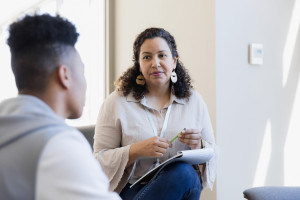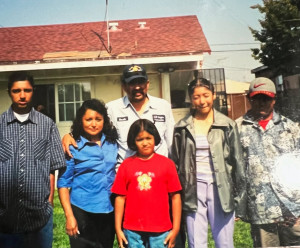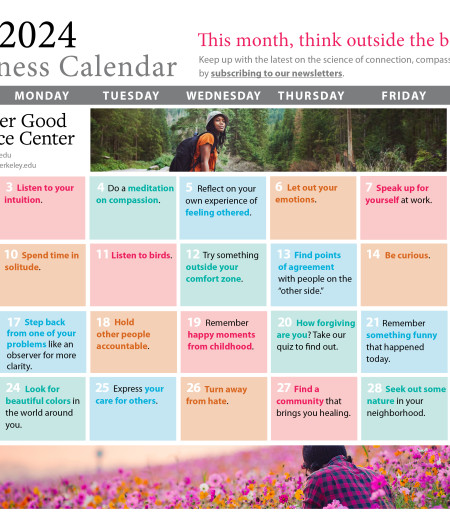How Undocumented Therapists Are Serving Other Immigrants

When Mayra Barragan-O’Brien was 14 years old, she and her mother were smuggled across the U.S.-Mexican border in a truck. What she remembers most about the 1,300-mile journey from Guadalajara was the sweltering heat. It was so hot that the bottom of her mother’s black tennis shoe melted from hiding underneath the backseat, and she fainted so often that Mayra lost count.

They were coming to America because the violence in their neighborhood had become life-threatening. Her mother had applied unsuccessfully for a visa several times, and she felt she had no choice but to flee. So she hired a coyote to get them across the border in secret and on to a safer life in San Diego, where they would reunite with the other half of their family.
Their first stop was a Denny’s. As they walked into the diner, Mayra felt an overwhelming sense of relief for more than the air conditioning. She was grateful for her mother, who was still alive, and the menu in front of her since she hadn’t eaten for hours. She ordered a piece of chocolate cake.
While they waited, she noticed an older white couple at a nearby table were looking at them and talking quietly. One of them pulled out a phone. Mayra didn’t understand English, but the coyotes, who were listening, knew the couple had called ICE, the U.S. agency that enforces immigration laws and detains undocumented immigrants for deportation. “Vámanos, vámanos!” they whispered urgently, hustling the startled Mayra and her mother out to the truck. They drove quickly to another Denny’s, where she finally got her cake. Her mother, shaken, ordered nothing.
From that moment on, Barragan-O’Brien knew she couldn’t talk about how she came to America. A good student, education became her singular focus instead. She went on to graduate high school with honors, but it took her 10 years to get an associate’s degree because she had to work—mostly at a warehouse packing frozen meat or driving a forklift. Then came the California Dream Act in 2011, which extended financial aid eligibility to undocumented students. Barragan-O’Brien seized the opportunity. She earned a bachelor’s degree in psychology and then a master’s in counseling psychology from Cal State San Bernardino.
As she pursued this work, she reached back for inspiration to her encounters with a psychotherapist who’d taught her a mantra of hope at her most difficult moment. It was a year before the Dream Act, when she was going through a deep depression after a failed relationship, on top of feeling like there were no opportunities because of her undocumented status. At one point, her family experienced homelessness, but even some subsequent successes backfired. She discovered a relative had called ICE on her family, jealous that they had saved up enough money to buy a house.
She’d gone to the therapist bawling, she recalls, saying that she had feelings of not wanting to live anymore. He walked her through a guided meditation that kept repeating “And remember there is hope.” She felt lighter after that session, she said, and wanted to be able to do the same thing for others—to ease people’s pain.
Looking back, she is now able to see her despair as a form of “immigration-related trauma—all of the experiences of being a newcomer in a world you don’t know,” she says. “A lot of people aren’t able to name that. ‘Why am I feeling sad? Why am I feeling anxious? Why am I feeling on edge? Why am I snapping for no reason?’ And it’s because of all the trauma that our bodies and our minds endure.”
Barragan-O’Brien’s insights fueled her desire to help others who’d been through the same traumatic experiences she had. She realized she might even have the skills to become a mental health healer and give back in some of the ways that her therapist had given to her. But there were some huge obstacles: As an undocumented person, it was hard enough for her to work legally. How could she ever hope to become a credentialed therapist, licensed by the state to do this work?
Indeed, for her and other undocumented people who want to address the mental health needs of their community, the route to becoming a licensed professional therapist is a hard one. But in California, it’s at least possible: In 2014, the state passed a law permitting undocumented residents to earn professional licenses, including as doctors and therapists. Nevada and Illinois followed suit in 2019.
In California, the biggest hurdle is obtaining 3,000 hours of client work supervised by a licensed professional, a requirement in the field to be able to practice on your own. Immigrants Rising, a San Francisco-based nonprofit that helps immigrants get into college and start careers, aims to facilitate the process through its Mental Health Career Program.
The goal is to increase the number of undocumented therapists so those in need can work with someone who can relate to their experience.
“We really want to send the message that there are so many contributions folks can bring outside of their immigration status,” says Rocío Preciado, director of mental health and career services at Immigrants Rising. “It’s only when we’re able to connect with others to help process the day-to-day challenges that are oftentimes amplified by the political messages we receive, that we’re able to contribute to the healing of our community.”
The glaring need for Latino therapists
Estimates of the number of undocumented immigrants in the U.S. range from 10.5 million to 12 million. Some 80% come from Latin America, followed by regions in Asia, Europe, the Middle East, and Africa. Since each country and culture is different, so are the mental health needs of each group. No matter where they come from, undocumented immigrants face a slew of chronic stressors—constant fear of deportation, demanding work schedules, manipulation from unscrupulous employers, experiences of trauma from their journey to the U.S. and in their home country. Together, these experiences create enormous risk of mental health conditions and challenges.
Access to therapy is also more difficult. Getting a therapist—especially an affordable one—is challenging for everyone these days, but for communities of color, finding a therapist who looks like them or speaks their language makes it even harder. In California, for example, only 9% of clinical counseling psychologists identify as Latino, followed by Asian at 8% and Black at 3%, according to data from the Healthforce Center at UCSF.
Immigrants Rising sees the need firsthand. It offers free Wellness Support Groups led by mental health professionals—including groups for women and LGTBQ+ people—to anyone around the country via Zoom. Its Mental Health Connector program, launched in 2019, links undocumented immigrants in California with therapists who are donating their time. So far, over 1,100 people have applied and 174 have been matched. Those who are uninsured or have limited resources are prioritized to see practitioners who have experience with the undocumented community.
The organization’s Mental Health Career Program began a year later. It allows therapists-in-training to become part of the Connector program and accumulate the hours they need for licensure. It also pairs them with a private practice for clinical supervision and provides professional and leadership training opportunities. Best of all, it gives participants a stipend: $14,000 for year one and $20,000 if they continue on for a second year.
Currently in the pilot phase, seven participants have completed the program to date, mostly Latina women. Some, but not all, are currently allowed to stay in the country through DACA—Deferred Action for Childhood Arrivals—the program created during the Obama administration to protect young adults brought to the U.S. as children from deportation and provide them with temporary work authorization. This year, 12 undocumented applicants vied for just six spots, due to the limited financial support the program has obtained from foundations and private donors. Preciado hopes to bring in new funds to increase the stipend and the number of participants.
She says many undocumented people want to pursue a career in mental health but are daunted and unsure about whether it’s even possible for them to become a licensed therapist. Preciado hopes to replicate the California training program in Illinois and Nevada, the two other states that have paths to clinical licensure for undocumented therapists.
A license provides the ability to start a private practice, which provides more flexibility and pay. And while those without DACA status can’t be legal employees, they can start a business or work as independent contractors.

Mayra (second from right) with her father, mother, and three siblings on the day they arrived in San Diego and were reunited.
© M. Barragan O’Brien
After Barragan-O’Brien graduated with her master’s degree in 2020, she needed to accumulate 3,000 supervised hours in order to get licensed. But since she didn’t have work authorization, she had to volunteer her time as an associate clinician in the San Bernardino County School District.
In addition to her time with clients, she spent hours writing clinical notes and evaluations, while also taking on paid workshop gigs with two other organizations and taking care of a young daughter. Barragan-O’Brien calculated it would take her five years to rack up the hours so she could take the licensing exam and officially become a marriage and family therapist. But there was little margin: Applicants must take the exam within six years of obtaining their associate number, which they can apply for after receiving a graduate degree, or start the process over. After two years, she found herself burnt out.
So she quit volunteering and started researching how she could make a therapy career sustainable. Eventually she came across a single sentence in a California Board of Behavioral Sciences FAQ that said associate clinicians could get a stipend as long as they’re part of a program that encourages underrepresented groups to enter the profession.
That was the catalyst for her to cofound the Mental Health Career Program. She worked with Immigrants Rising to get it off the ground and eventually went through the program herself last year. It was the first time she didn’t have to worry about paying bills.
These days, when she’s not roller skating, spending time with her daughter, podcasting with her sister, or listening to the band Hanson, she runs UndocuMental Health. The nonprofit provides training to organizations and educational institutions on best practices when working with the undocumented community—such as hanging art by undocumented artists to signal that it’s a safe space or not calling the police as a first response in case of a mental health crisis.
Barragan-O’Brien became a legal permanent resident in September. She’s still 250 hours short of the licensing requirement and continues to work with her supervisor, determined to be of service to her community.
“There’s so much potential among undocumented folks but often they’re not able to see it,” she says. “That’s when I feel the most motivated—when I get to see their face the moment they realize what their potential is and begin to tap into their own agency. That really keeps me going.”
Stranger in a strange land
Julio Zamarripa grew up in a small rural town in Mexico with a big sense of community. As a kid, he’d wake up early to help his grandfather feed the cows or play “farm” with his toys. One day, when he was 10 years old, his mother told him he wasn’t going to school, and instead, going to see his dad in America. They abruptly left. He never had a chance to say goodbye to his hometown.
Zamarripa was angry when he came to the States because he didn’t know the language or culture, and was bullied a lot. In his family, they didn’t talk about emotions. He was a male and was supposed to hold it all in. The feeling of being lost and disconnected continued as he got older, amplified when he was placed in remedial courses at community college.
A career in anything didn’t seem likely until he became part of the Puente Project and met a counselor who was also a licensed marriage and family therapist. Even though she was a citizen, she shared parts of her own journey and made him see the different possibilities for himself. He told her he wanted to be like her one day. She responded, “Mijo, you will do that and more.”
In 2013, he got DACA status and, seven years later, his master’s in counseling at the University of LaVerne in California. He was a part of the inaugural Mental Health Career Program cohort. The first year, he saw 10 clients through the Connector program; the second year, where he was allowed to continue, he saw 15 clients. In total, he was able to accumulate 1,500 hours. The stipend also covered additional expenses for Zamarripa, like renewing his associate number and some specialized training. Most importantly, it gave him a network of people who shared similar experiences.
“Even within our undocumented community, we’re all experiencing so many different challenges,” he says. “Creating that space for us to share our stories and be able to say that I’m not the only one who feels burnt out—it helps us feel like we’re not alone.”
Zamarripa now has only about a third of the supervised hours left to complete the requirements. Because participants can only accumulate 300 to 500 hours over the course of 10 months, the program is allowing them to continue into a second year. Another challenge is ensuring that clients in the Connector Program show up for therapy sessions, since it impacts not only their progress but the ability of the therapists-in-training to log needed hours.
Still, feedback from clients who show up has been overwhelmingly positive. And for the trainees, knowledge about paid opportunities and trauma-informed practices has grown. In an evaluation survey Preciado did for the past two years, there was a 113% increase in knowledge around establishing a private practice. Immigrants Rising will soon also provide pro-bono business coaching for participants who completed the program to help build a caseload of clients.
Zamarripa now works as a counselor and instructor at two community colleges, and is also an associate therapist with First-Gen Therapy. Founder Mara Sammartino started First-Gen Therapy as a Vacaville-based private practice in 2022 to provide culturally responsive therapy and create a safe space for budding therapists to learn under her license—something she wishes she’d had when she entered the field 13 years ago.
“One of the hidden pitfalls of becoming a therapist is that you also don’t have supervisors who are bilingual or bicultural,” says Sammartino, who is Nicaraguan-American. “All of my supervisors were white. There was nobody talking to me about how ICE raids were heightening hypervigilance or how there might be an increase in domestic violence.”
Sammartino hopes efforts like Immigrants Rising can help boost the number of therapists who can relate to their clients’ experiences. As Zamarripa’s clinical supervisor, she trained him on taking progress notes and assessments and acted as a sounding board for him to work through client issues. When she brought him on as an associate at First-Gen Therapy—“our practice,” she called it—it allowed him to continue working with clients paying a sliding-scale fee through the Mental Health Connector Program while also taking on new ones as an independent therapist.
As a therapist and a trainer, Sammartino recognizes the emotional challenges of vicarious trauma. She’s unafraid to be vulnerable, and doesn’t hesitate to share parts of herself as a way to connect.
“Do you know how many times I’ve told abuelitas I work with that I have to cancel because my son is sick? And they’ll be like, ‘Put Vicks Vapor Rub on his feet and make sure you put some socks on. And please send me a picture of your son to make sure you did it correctly,’” Sammartino says, adding that she promptly sends them a picture. “That’s the thing about providing culturally responsive care. I am not bound to the white experience. Nor am I bound to the Latino experience. I am bound to the experience that I’m living in at the moment.”
She encourages Zamarripa—whom she calls “the platinum golden goose,” since being male and Latino in the field is rare—to do the same. Many of his clients identify with him. He lets them know they don’t have to share their story over and over again if they don’t want to—and that, ultimately, they’re the expert in their own lives. His job is to give them tools and to bear witness.
But when it does happen that a client says something that echoes an experience of his own, and he feels it in his core, he’s learning to draw from his own story. Recently, he had a man who was trying to hold it together in a session. Zamarripa could tell he was in distress and wanted to let his emotions out.
“I told him, ‘You don’t have to be strong right now. What would happen if you were to let it go?’ As soon as I said that, the client started crying for a good minute,” Zamarripa says. “At the end he said, ‘No one has ever told me I didn’t need to be strong at the moment. And I felt so free letting go of all of that.’”
The article was originally reported and published by MindSite News, a national nonprofit news outlet that reports on mental health.
Reporting for this story was supported by the California Health Care Foundation and the National Institute for Health Care Management Foundation. Sign up for the MindSite News Daily newsletter.









